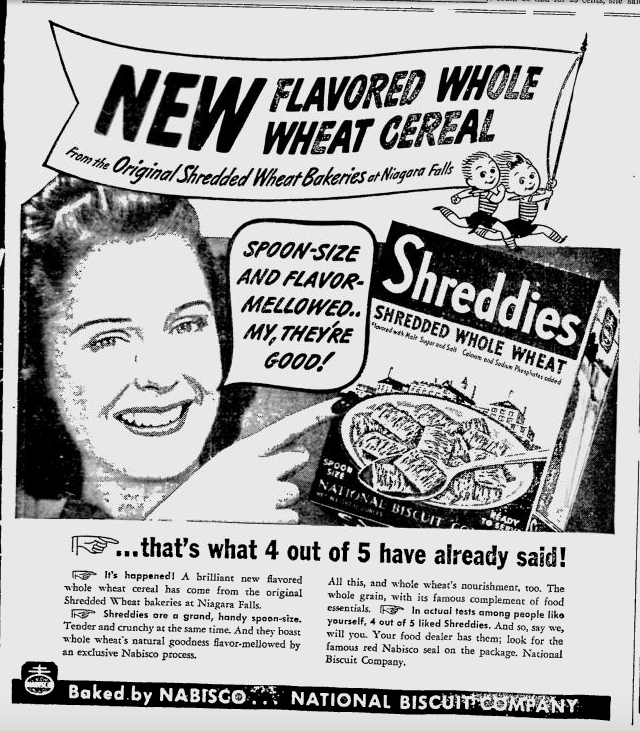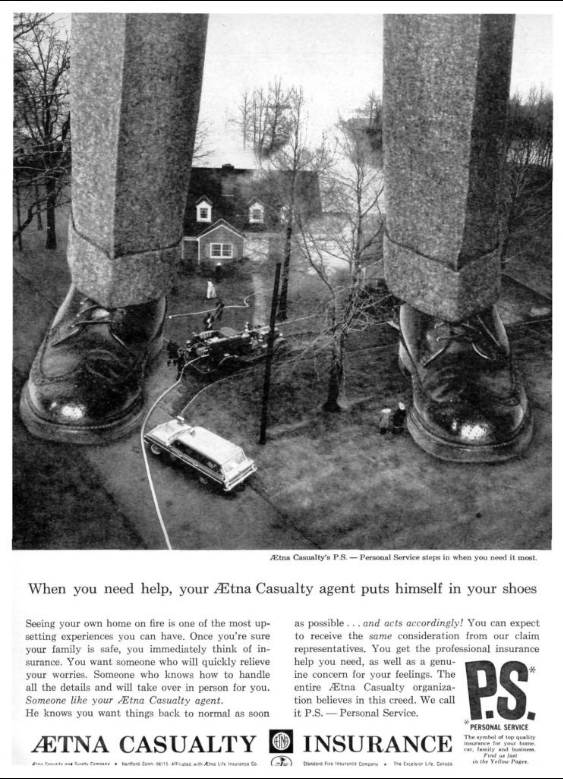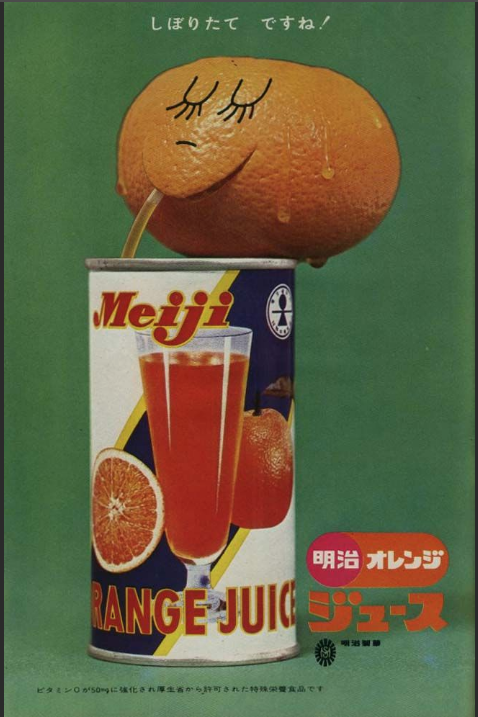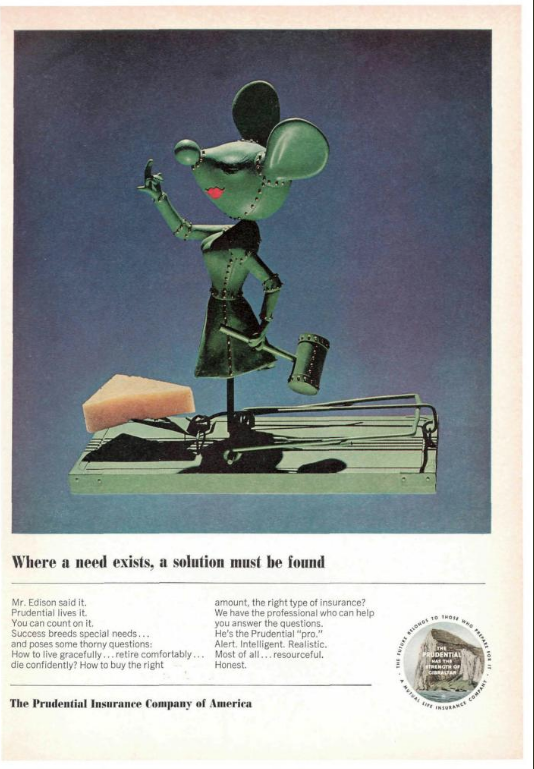Advertising
Mating Call of the Humboldt Penguin
Buy our speakers because they sexually excite penguins!
Posted By: Alex - Mon Apr 27, 2020 -
Comments (2)
Category: Advertising, 1980s
Undies Are Gossips!
LUX Soap's 1942 ad campaign warned of the danger of talking underwear.
Some analysis by Melissa McEuen in Making War, Making Women: Femininity and Duty on the American Home Front:
The "Undies Are Gossips" campaign radiated a core message familiar to Americans early in the war: the power of talk. U.S. government propaganda connected conversations with death and destruction for U.S. troops: "Somebody blabbed — button your lip!" and "A Careless Word… A Needless Sinking" warned viewers to check their conversations. One resonant quip suggested "Loose Lips Might Sink Ships."

Spokesman Review - Mar 1, 1942

Philadelphia Inquirer - July 19, 1942
Posted By: Alex - Sat Apr 25, 2020 -
Comments (3)
Category: Advertising, Underwear, 1940s
Shreddies vs. Shredded Wheat

Source of ad.
The Wikipedia entries for Shredded Wheat and Shreddies fail to explain the overlapping existence of two identical cereals from the originator, Nabisco. Much investigation needs to be done. Was one more for the Canadian market?
Posted By: Paul - Fri Apr 24, 2020 -
Comments (2)
Category: Advertising, Cereal, 1940s, North America
She was boring her husband to death
This ad for Vivarin stimulant tablets ran in newspapers and magazines in 1971. It prompted a complaint from the FTC.
San Bernardino Sun - Mar 28, 1971
Ivan Preston provides more details in The Great American Blow-Up: Puffery in Advertising and Selling:
"One day it dawned on me that I was boring my husband to death. It was hard for me to admit it—but it was true…. Often by the time he came home at night I was feeling dull, tired and drowsy, and so Jim would look at television and, for the most part, act like I wasn’t even there. And I wasn’t. I decided that I had to do something. I had seen an advertisement for a tablet called Vivarin. It said that Vivarin was a non-habit forming stimulant tablet that would give me a quick lift. Last week… I took a Vivarin tablet… just about an hour before Jim came home, and I found time to pretty up a little, too. It worked. All of a sudden Jim was coming home to a more exciting woman, me… The other day—it wasn’t even my birthday—Jim sent me flowers with a note. The note began: ‘To my new wife…'"
All very nice, but but the contribution of Vivarin was to provide merely the amount of caffeine found in two cups of coffee. No miracle aphrodisiac, just good old caffeine at a premium price!
The major allegation of the FTC's complaint about Vivarin concerned this social-psychological misrepresentation... But the Vivarin ads were also alleged to be deceptive because they did not disclose caffeine to be the critical ingredient.
Posted By: Alex - Mon Apr 20, 2020 -
Comments (3)
Category: Drugs, Advertising, Wives, 1970s
Follies of the Madmen #474
Somehow this image of a visiting insurance giant is not reassuring to me. He implies more destruction, rather than solace.
Source.
Posted By: Paul - Mon Apr 20, 2020 -
Comments (4)
Category: Business, Advertising, Giant People in Ads, Destruction, 1960s
Follies of the Madmen #473
Posted By: Paul - Thu Apr 16, 2020 -
Comments (0)
Category: Anthropomorphism, Business, Advertising, Food, Stop-motion Animation, Twenty-first Century
Veggie Cannibalism
We all know of the "animal cannibal" motif in ads. A chicken or cow or pig dressed as a chef invites the viewer to snack on his relatives. But I have never seen veggie cannibalism till this ad.Can WU-vies find other examples?

Posted By: Paul - Wed Apr 15, 2020 -
Comments (1)
Category: Animals, Business, Advertising, Cannibalism, Vegetables
Follies of the Madmen #472
That mouse is definitely giving the finger. Is it supposed to be a sexy lure for male mice to entice them into the trap? I'm confused....
Source.
Posted By: Paul - Fri Apr 10, 2020 -
Comments (8)
Category: Animals, Anthropomorphism, Antisocial Activities, Business, Advertising, Death, 1960s
Follies of the Madmen #471
Posted By: Paul - Fri Apr 03, 2020 -
Comments (4)
Category: Addictions, Business, Advertising, Innuendo, Double Entendres, Symbolism, Nudge-Nudge-Wink-Wink and Subliminal Messages, Tobacco and Smoking, 1960s
The Girl on the Magazine Cover
Posted By: Paul - Sun Mar 29, 2020 -
Comments (3)
Category: Beauty, Ugliness and Other Aesthetic Issues, Business, Advertising, Magazines, 1940s

| Who We Are |
|---|
| Alex Boese Alex is the creator and curator of the Museum of Hoaxes. He's also the author of various weird, non-fiction, science-themed books such as Elephants on Acid and Psychedelic Apes. Paul Di Filippo Paul has been paid to put weird ideas into fictional form for over thirty years, in his career as a noted science fiction writer. He has recently begun blogging on many curious topics with three fellow writers at The Inferior 4+1. Contact Us |




